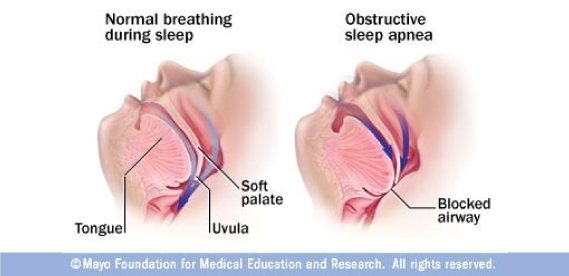Sleep Apnea

Sleep Apnea is a common condition which occurs when a person’s airway becomes partially or completely blocked many times during sleep. Around 5% of men and 3% of women have Sleep Apnea that is severe enough to have negative effects on their health, causing sleepiness, high blood pressure and increased risk of cardiac disease and diabetes. Given how common Sleep Apnea is, and the negative effects it has on health, Sleep Apnea is important to look for and treat if present
Sleep Apnea and Snoring Are they different
They are similar and occur when muscles in the tongue and upper airway relax during sleep and cause blockage of the airway – partial or complete. In snoring, the airway slightly narrows, enough to cause vibration in the back of the airway which then generates a snoring noise. In Sleep Apnea the airway gets further narrowed or blocks completely making the breathing more difficult. This leads to frequent short awakenings, called arousals, as the individual’s brain senses this and wakes up so as to regain muscle control in the throat and reopen the airway. This constant awakening and fragmented sleep means that people with apnea do not get sufficient or good quality sleep, resulting in sleepiness and/or fatigue.
What are the Common Symptoms of Sleep Apnea?
Loud Snoring
Fatigue
Daytime Sleepiness
A sense of waking choking or gasping for air
Apneas (pauses in breathing) witnessed by bed partner
Insomnia
Problems with concentration and memory
Impotence
Mood changes or Feeling irritable
Frequent urination in the night
Morning headaches on waking up
Who is at risk of having Sleep Apnea?
Overweight or obese people
Patients with comorbid conditions like Diabetes, hypertension ,heart failure, atrial fibrillation should be screened for Sleep Apnea
If there is a family history of OSA or snoring
People with small lower jaw and crowded upper airway
Male gender
Large neck circumference, Large tonsils or a blocked nose can also cause Sleep Apnea.
People with associated Medical Conditions as below are also at increased risk of OSA
Medications like Sleeping Pills, sedatives, narcotics and alcohol consumption at bedtime
Post-menopausal (for women)
Hypothyroidism (low levels of thyroid hormone)
Acromegaly (high levels of growth hormone)
Muscular diseases like dystrophies etc.
What are the health risks associated with Sleep Apnea?
Left untreated, sleep apnea can have significant health consequences
- Doubles the risk of Hypertension
- Increased risk of heart attack or heart failure ,Atrial Fibrillation (double the risk)
- Increases the risk and causes poor control of Type 2 Diabetes Mellitus
- Increased risk of stroke (3 times greater risk)
Can Sleep Apnea reduce the individual’s quality of life?
Yes, OSA significantly impacts the social and family life of the individual. Excessive daytime Sleepiness and fatigue due to OSA makes it difficult for them to work and can lead to job loss. Depression (5 Fold increase) and memory loss is very common in people with untreated OSA. They find it hard to maintain relationships, and are not able to engage in social activities, especially physical exercise, because they are too tired. Their Spouses and bed partners choose to sleep in separate bedrooms because of loud and disturbing snoring.
How is Sleep Apnea detected ?
The role of further evaluation and treatment is to work out why someone has Sleep Apnea, what effect it is having on their health, and what treatments are best suited for them. If you have symptoms of Sleep Apnea, you should discuss them with your doctor or consult a Sleep Specialist. They may advise you to have a sleep study to determine if sleep apnea is present, and if so, how bad it is.
Sleep Cure Solutions is a world-class comprehensive Sleep Centre committed to the excellence in the diagnosis and treatment of sleep disorders. It is built upon the experience of an outstanding team of experts in the field of Sleep medicine.
How is sleep apnea treated ?
In treating sleep apnea, it is important to focus on the goal of treatment, as the aim of treatment will determine choice of treatment. For those with Severe Sleep Apnea, the aim of treatment is to improve sleepiness during the day and also to reduce the negative effects of Sleep Apnea on blood pressure, heart function and diabetes. Whereas for those with mild sleep apnea, the aim of treatment may be to reduce the noise of snoring that is disturbing the bed partner. Therefore, it is important to know the severity of sleep apnea and its effects on health to develop and appropriate treatment plan for each individual.
Treatment
Restore regular breathing during sleep
Relieve symptoms such as loud snoring and daytime sleepiness
Treatment may improve other medical problems linked to sleep apnea, such as high blood pressure. Treatment also can reduce your risk for heart disease, stroke, and diabetes.
Lifestyle changes and/or mouthpieces may relieve mild sleep apnea. People who have moderate or severe sleep apnea may need breathing devices or surgery.
If you continue to have daytime sleepiness despite treatment it’s important to ensure that you are getting enough sleep; adults should get at least 7 to 8 hours of sleep; children and teens need more.
